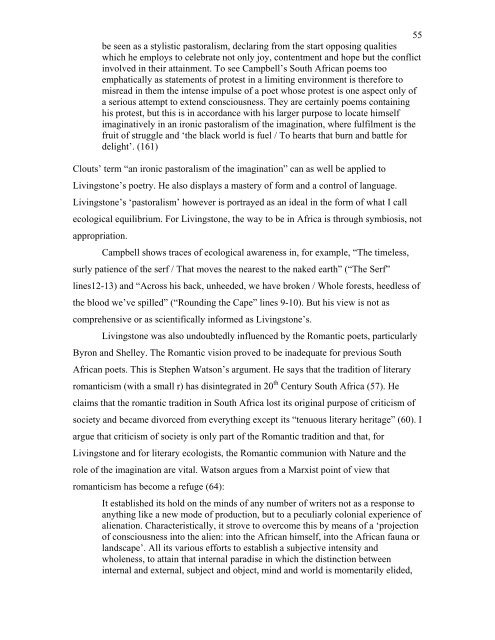"Symbiosis or Death": - Rhodes University
"Symbiosis or Death": - Rhodes University
"Symbiosis or Death": - Rhodes University
You also want an ePaper? Increase the reach of your titles
YUMPU automatically turns print PDFs into web optimized ePapers that Google loves.
55<br />
be seen as a stylistic past<strong>or</strong>alism, declaring from the start opposing qualities<br />
which he employs to celebrate not only joy, contentment and hope but the conflict<br />
involved in their attainment. To see Campbell’s South African poems too<br />
emphatically as statements of protest in a limiting environment is theref<strong>or</strong>e to<br />
misread in them the intense impulse of a poet whose protest is one aspect only of<br />
a serious attempt to extend consciousness. They are certainly poems containing<br />
his protest, but this is in acc<strong>or</strong>dance with his larger purpose to locate himself<br />
imaginatively in an ironic past<strong>or</strong>alism of the imagination, where fulfilment is the<br />
fruit of struggle and ‘the black w<strong>or</strong>ld is fuel / To hearts that burn and battle f<strong>or</strong><br />
delight’. (161)<br />
Clouts’ term “an ironic past<strong>or</strong>alism of the imagination” can as well be applied to<br />
Livingstone’s poetry. He also displays a mastery of f<strong>or</strong>m and a control of language.<br />
Livingstone’s ‘past<strong>or</strong>alism’ however is p<strong>or</strong>trayed as an ideal in the f<strong>or</strong>m of what I call<br />
ecological equilibrium. F<strong>or</strong> Livingstone, the way to be in Africa is through symbiosis, not<br />
appropriation.<br />
Campbell shows traces of ecological awareness in, f<strong>or</strong> example, “The timeless,<br />
surly patience of the serf / That moves the nearest to the naked earth” (“The Serf”<br />
lines12-13) and “Across his back, unheeded, we have broken / Whole f<strong>or</strong>ests, heedless of<br />
the blood we’ve spilled” (“Rounding the Cape” lines 9-10). But his view is not as<br />
comprehensive <strong>or</strong> as scientifically inf<strong>or</strong>med as Livingstone’s.<br />
Livingstone was also undoubtedly influenced by the Romantic poets, particularly<br />
Byron and Shelley. The Romantic vision proved to be inadequate f<strong>or</strong> previous South<br />
African poets. This is Stephen Watson’s argument. He says that the tradition of literary<br />
romanticism (with a small r) has disintegrated in 20 th Century South Africa (57). He<br />
claims that the romantic tradition in South Africa lost its <strong>or</strong>iginal purpose of criticism of<br />
society and became div<strong>or</strong>ced from everything except its “tenuous literary heritage” (60). I<br />
argue that criticism of society is only part of the Romantic tradition and that, f<strong>or</strong><br />
Livingstone and f<strong>or</strong> literary ecologists, the Romantic communion with Nature and the<br />
role of the imagination are vital. Watson argues from a Marxist point of view that<br />
romanticism has become a refuge (64):<br />
It established its hold on the minds of any number of writers not as a response to<br />
anything like a new mode of production, but to a peculiarly colonial experience of<br />
alienation. Characteristically, it strove to overcome this by means of a ‘projection<br />
of consciousness into the alien: into the African himself, into the African fauna <strong>or</strong><br />
landscape’. All its various eff<strong>or</strong>ts to establish a subjective intensity and<br />
wholeness, to attain that internal paradise in which the distinction between<br />
internal and external, subject and object, mind and w<strong>or</strong>ld is momentarily elided,

















